babosa-img id='WJCNVHLBQ5GHNLTCHCDBAPUUGI' alignment='full' type='photograph' />
On The Road is Think Out Loud’s radio road trip series: conversations with wanderers, tourists and residents along Oregon’s backroads and highways.
Pull up a map of Portland's urban core, and you'll see a tidy checkerboard of right-angled roads. The city's blocks pack together like snugly fit teeth. Its streets run crisp lines — north to south, east to west. The system's simple, elegant.
And then there's Sandy Boulevard.
Sandy cuts a wide, reckless scar through Portland's otherwise orderly grid. It scoffs at your roundabouts. It laughs at your stop sign.
We wanted to get a better feel for this decidedly punk rock boulevard. And so we decided to walk it — all the way from its origin, near the corner of SE 7th and Alder, to The Grotto, out at NE 85th.
Stop One: Everyday Music
Lower Sandy Boulevard at 9 a.m. is an unholy snarl of cars and commuters. By the time we get to Everyday Music on 19th, we're happy to duck inside — away from the traffic and the noise.
That's where we meet Jimmi Burk.

Jimmi Burk and Doo-Doo the clown.
Phoebe Flanigan / OPB
Burk’s shuffling through DVDs, on the hunt for "Pearl Harbor." His girlfriend works at a retirement center and requested that he bring it to play for her residents — many of whom actually lived through the war.
Burk tells us that when he’s not digging up DVDs, he works for a sanitation company, cleaning out port-a-potties. Before that, he says, he was "working the other end of it" as a chef.
Port-a-potties pay better, but Burk says he misses the creativity he got to express as a cook. These days, he channels that creativity into decorating his truck.
He has a clown doll strapped to the front of the truck called Doo-Doo. Doo-Doo's smiling on one side, frowning on the other. Jimmi flips him over to show the outer world his mood. "It just lets everybody know what my day's going like ... Sometimes, if I'm having a really good day, I'll flip it around just so I see smiley clown."
Stop Two: The Jewelry Buyer
Across the street from Every Day Music, another storefront catches our eye. Sandwiched between a clinic advertising "hemorrhoids nonsurgical treatment" and a deconstruction company, the sign reads simply: We Buy Gold.

Swerdlick has been working in the jewelry business since he was 17 years old.
Phoebe Flanigan
Randy Swerdlick owns the business. When we walk in, he's behind the counter, working on a customer's watch. Besides buying gold, he also buys and sells jewelry. And that's not his only venture — he and his nephew co-own a pizza shop just down the street on 27th.
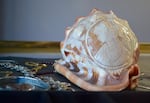
Carved cameo inside Swerdlick's shop.
Phoebe Flanigan / OPB
In the decades he's been in the business, Swerdlick says he's only ever kept one piece of jewelry — a diamond and sapphire pinky ring that he wears every day.
“When I was coming up everybody was in their 70s and I was still a teenager. And all the old guys I liked — that I really admired — all had cool pinky rings. So I thought well, I want to be one of those guys!”
Stop Three: The Zipper
Next, we thought we'd pay a visit to Swerdlick's other business, the pizza shop.

The Zipper
Phoebe Flanigan / OPB
Turns out, it's just one of several 'micro-restaurants' inside of a larger building called The Zipper. If you've driven down Sandy Boulevard in the past year or so, you've probably noticed it. It's a large, triangular building, decorated on all sides with lenticular art that only comes into focus as you drive by.
Kevin Cavenaugh, the developer who created the building, calls it "art at 35 miles per hour."
The Zipper's one of six properties that Cavenaugh owns on Sandy Boulevard. All of them are creatively designed — and they don't always maximize profits. Cavenaugh's most recent project actually features a plan for internally-subsidized affordable housing.
But that means that Cavenaugh's making a lot less money on his properties than he theoretically could be. When we ask why he'd knowingly forego those profits, his answer’s simple — he already has enough.
“Right now, post-election, I love questioning the definition of enough. A lot of investors would never give me their money – 'why would I make less money with Cavenaugh than make more money with anyone else?' A lot of investors are happy to give me their money because they too have enough.”

Michelle Block and her daughter Sophia stop for coffee at The Zipper.
Phoebe Flanigan / OPB
Stop Four: The Repo Lot
The next person we meet on Sandy also seems to be caught up in that question of 'enough.'
Rita Sabin is standing in a car lot taking pictures of the inside of a dark gray sedan when we approach. She tells us she’s doing a damage report on a vehicle that she and her business partner just repossessed.

Rita Sabin works for a repossession company on Sandy Boulevard.
Phoebe Flanigan / OPB
Sabin got into the repossession industry about 10 years ago. It pays the bills, she says, but emotionally it's a taxing job. Often times, she has to repossess from people who are living out of their cars. And she estimates that only about a quarter of the folks whose cars are repossessed are ever able to reclaim them. Sabin thinks predatory subprime lending practices could be responsible for that low number. But ultimately, she’s just the middle-woman in an unfortunate transaction. Sympathy, she says, is the best tool for dealing with anyone who may want to shoot the messenger.
“You know, we all make mistakes. And the economy isn't the best right now. Stuff happens sometimes in life. I can't fix it – I can't fix the world's problems. But I can try to make this part of the problem as easy as possible for them.”
Stop Five: Fantasy For Adults Only
Outside of a big brown building studded with one-way reflective windows, Kathy Norton and Marykay Beacom are having a cigarette break. They work together here at Fantasy for Adults Only, and they've both been doing it for almost a decade.
That's a long time for a retail job — but they tell us that they really enjoy what they do. It allows them to connect with people, and to break down taboos around sex and sexuality.
“You get to help people in an area of their lives that other people in their lives wouldn't necessarily help them with. It's real confidential and they open up to us. So we're able to educate them in a safe environment — a safe and non-judgmental environment.”

Kathy Norton and Marykay Beacom outside of Fantasy for Adults Only.
Phoebe Flanigan / OPB
Stop Six: Full Life
A few blocks past Fantasy for Adults Only, we come across Full Life — a day center for adults with developmental disabilities. They offer arts, recreation, and vocational programs.
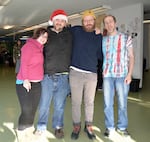
Alix, Bradley, Rob Gray, and Sean inside of Full Life, a day program for adults with developmental disabilities.
Phoebe Flanigan / OPB
Rob Gray's been working here for eight years. When he's not at Full Life, he's a musician, a visual artist, and a spoken word poet. Gray tells us that this is a job that never gets old.
“It's a bit like a soap opera in here every day ... That's the main thing probably, and the reason why I've stuck with this field is that it's not sitting down and getting bored. You're not in an office somewhere. It's working with people and talking to people pretty much all day.”
Stop Seven: Sharpening4U
Harmonie Medlin-Bennett is hard at work sharpening things when we walk into her shop, Sharpening4U.
Medlin-Bennett tells us she started the business with her dad. Trained as a jeweler, he and Medlin-Bennett began sharpening knives during the recession, when they needed more reliable work.
“Everybody owns something pointy. And everything that's pointy does go dull.”
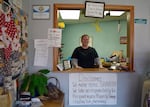
Harmonie Medlin-Bennett inside of her shop, Sharpening4U.
Phoebe Flanigan / OPB
Medlin-Bennett can sharpen just about anything: scissors, chisels, garden tools. Still, the big ticket item at Sharpening4U is old-fashioned push mowers.
A single push mower can take anywhere from one to eight hours to finish, and Medlin-Bennett says those jobs take up the bulk of her time between February and October.
Stop Eight: Reo's Ribs
By noon, we're reaching the midpoint of our journey, at 42nd and Sandy. After a morning spent sidewalk-trekking in below-freezing weather, we're also starting to get hungry. When we smelled barbecue wafting across Sandy Boulevard from Reo's Ribs in the old Hollywood Burger Bar, we knew we had to stop.
Inside, the eponymous Reo Varnado is working through lunch orders.

Reo Varnado has been barbecuing since he was five years old.
Phoebe Flanigan / OPB
Varnado grew up in Mississippi, but came to Portland in the late 1990s looking for a childhood friend named Antonio. The two of them grew up together, but as a young man, Antonio joined the military and disappeared.
Varnado thought his friend was dead — until he got an unexpected phone call from his sister. She told him that Antonio was alive and well, in a place called Portland, Oregon. Varnado had never heard of Portland before, but he bought a plane ticket and came to find his friend. When he arrived, he discovered he had other family members living in Portland, and decided to stick around.
Varnado's been slinging ribs in the Portland area ever since — and he knows his stuff. Earlier this year he was actually flown down to Los Angeles for a cook-off with Martha Stewart. It was for a TV program called 'Martha and Snoop's Potluck Dinner Party' that Stewart co-hosts with Varnado's nephew, rapper Snoop Dogg.
Varnado told us he stole the show.
“She's a good person but, everybody cooks different. She said take out your hand and sprinkle stuff. Sprinkle's not gonna get it when you're feeding a lot of people.”
Stop Nine: Thu Fashion
Across the street from Reo's Ribs, Thu Duong is just preparing to take her lunch break. She owns a sewing and alterations business just off of Sandy Boulevard called Thu Fashion.
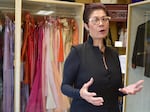
Thu Duong sews and alters clothing on Sandy Boulevard.
Phoebe Flanigan / OPB
When we arrive, Duong is over the moon to see us. As it turns out, the day of our visit is the last she’ll be in the United States for some time. She’s going back to Vietnam for a month-long vacation — her first in 12 years.
Duong tells us that she and her husband have been avoiding the trip on account of his weak stomach. They’ve been away from Vietnam for so long that he has trouble digesting the street food she so loves to eat while home.
But this year, Duong said, it feels important to go — really important. She wants to visit the shrine of her ancestors, to thank them for the incredible luck she’s been having in family, career, and business.
“That's why I really want to come back — to say thank you, thank you. All of you give us lovely life.”
Duong grew up in a small village outside of Danang. As a child, her family was fairly well off. But after the fall of Saigon at the end of the war, they lost everything. Duong, her parents, and her eight siblings moved in with their grandmother. She tells us that in those days, life was hard.
As a young teenager, Duong started going to the movies to escape the harsh reality of day-to-day life. She took solace in romantic films — which all seemed to feature beautiful women in beautiful clothes who spent much of their days sitting at coffee shops. Duong promised herself that one day, she too would wear beautiful clothes and spend her days at coffee shops.
Years later, Duong's dream has come true. These days, she tells us, she goes to the coffee shop every day — twice a day. Her customers ask why she doesn't just make coffee at home.
“I say no, all of you don't understand. I don't drink coffee in the house — no. I want to be sitting down in a coffee shop. That's my dream.”
Stop 10: Mittens Motel
We say goodbye to Thu Duong and continue on down Sandy — until we’re distracted by movement in a window on 60th. Three kittens are playing on the windowsill.

This kitten's waiting to be adopted at the Mittens Motel, a boardinghouse for cats.
Phoebe Flanigan / OPB
That's how we discovered the Mittens Motel, a boardinghouse for cats. Inside, cats of all stripes roam free. They're curled on the welcome desk, stalking the hallways, peeking down from the tops of large plywood cages.
Denise Struzan helped open this place seven years ago. She tells us they’re currently housing about 20 cats. Some of the cats are boarders, but others were abandoned at the Mittens Motel and adopted by Struzan and her business partner. It’s a practice they’ve had to curb recently, as it cost too much money to put the abandoned cats up in place of boarders.
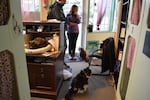
Cats roam free at the Mittens Motel.
Phoebe Flanigan. / OPB
Stop 11: Lou Watson's House
Lou Watson is an artist, and back in 2013 she was looking to buy a house here in Portland. She and her kids fell in love with a beautiful purple craftsman. The only problem? It was right on Sandy Boulevard. Watson and her family worried about the noise and the traffic. But the price was right, so they pulled the trigger
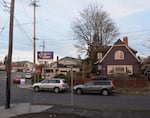
In 2013, Lou Watson and her kids fell in love with a purple craftsman — right off of Sandy Boulevard.
Phoebe Flanigan / OPB
In the years since, Watson has been bending her artistic energies towards an alchemical exercise of sorts: she set out to transform the unappealing elements of life on a busy four-lane boulevard into something tolerable — beautiful, even.
Watson began with the traffic noise. She and her kids practiced reimagining the rush of cars past the house as the sound of ocean.
“We kind of adopted it and tried to make friends with it, rather than try and battle against the noise.”
Watson came up with other projects for changing her relationship with Sandy Boulevard, too.
For one of them she grabbed a lab coat and a dustpan and set out to measure just how sandy Sandy Boulevard really is. For another, she studied the street's many triangular plots. Because Sandy cuts a diagonal through a grid system, there are a lot of them. And Watson says that according to feng shui, that's very bad luck. She looked at the data and found that businesses on triangular plots along Sandy do seem to shutter more often than those on their rectangular counterparts.
These days, Watson says, she's made her peace with Sandy. Encouraged by the success of her undertaking, she's setting out to tackle an even hairier project: befriending Interstate 5.
Stop 12: Pirate's Cove
As we leave Watson’s house, it’s beginning to get dark. We head toward our final destination, but get distracted outside of the Pirate’s Cove.
You might recognize this building. It’s a big jug, right off of 74th and Sandy. It was built in 1928 as a soda shop and service station called the Orange Blossom Jug Lunchette. But these days, it’s a strip club.
Inside, we meet bartender Christy Alcazar. She tells us she never could have imagined that this is where her life would lead her.
Alcazar was raised in a strict Catholic home, and she says she was notoriously shy as a kid. When she moved to Portland, she got a job as a bartender and realized she’d either have to get over her social inhibitions quick, or risk her tip money. So, in a project to become more extroverted, Alcazar went out and picked up a job at a porn shop.
“The first two weeks were like — bright red, mortified, terrible. And then after that I was fine.”
Alcazar says her plan worked. Nowadays, she’s comfortable doing just about anything. She’s active in Portland’s burlesque scene and BDSM community. And she loves her job here at Pirate’s Cove, where she says her co-workers and regulars are like family.
Stop 13: The Grotto
Nine hours, two dozen interviews, and four and a half miles later, we finally made it to The Grotto.

The Grotto is a Catholic sanctuary in Northeast Portland famous for its annual Festival of Lights.
Phoebe Flanigan / OPB
Megan Williams grew up singing at The Grotto each holiday season with her high school choir. This year, she's back for a visit with her two-year-old, Piper.
“I'm not super religious but I find [The Grotto] very peaceful, and I find it very comforting this time of year.”
When finished talking to Williams, we moved on through the Grotto and soon found ourselves face-to-face with Storm, a seven-foot-tall camel who lives in Tacoma, Washington.
Storm's handler, Will Johnson, tells us there are only three rules to dealing with a camel. First, never trust a camel completely. They're mischievous beasts. Second, make sure you're clear-minded when dealing with camels. They can pick up on what you're feeling. And third, there's really no rules to camels.
But that's not all we learned. Johnson also blew open a pervasive camel myth. See, those humps? They're not actually filled with water.
“They store fat. So that's their surplus energy reserve. If they were to run out of food, that's what they would live off of.”
Think of it like a useful potbelly — on the camel's back. If a camel goes without food for long enough, the hump can actually shrink down and begin to droop.

Storm with his handler, Will Johnson.
Phoebe Flanigan / OPB
For more stories from Oregon's highways and back roads, check out the rest of our On The Road series.